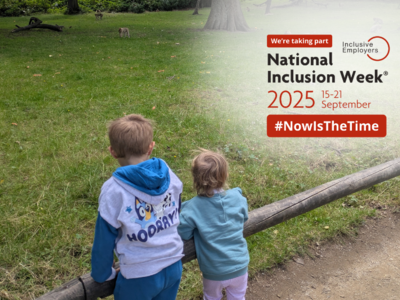Happy International Women's Day! It's been a challenging year since last March so we asked our Head of HR, Anna Kramer, some searching questions about how Outsource UK has been able to support our employees and our candidates and where we have been able to #ChooseToChallenge.
How have our OUK colleagues demonstrated courage, flexibility, and collaboration across the business this past year?
Our employees have been incredible throughout the last year. When the pandemic took hold we switched to home working like many other companies. Despite the challenges that home working can bring (for example isolation, blurring of lines between home/work life) our employees adapted brilliantly. Our company motto is “Taking Care of Everything” and our employees really did demonstrate this sentiment from day one of lockdown; checking in with each other, celebrating each other’s success, participating in team meetings, the list is endless.
Unfortunately during the first lockdown, we made the difficult decision to furlough some of our employees, and their cooperation and willingness to agree to be placed on furlough was overwhelming. They understood why we had to make the decision and made what was a difficult decision as smooth as possible. In return, we ensured we kept in regular contact with furloughed employees, to ensure they knew what was happening in the business and still felt part of the team.
Also, credit goes to those employees who remained working, as they really stepped up too. They took on additional work, some even agreed to move into new roles. There was a definite sense of a collective effort to work as hard as possible so we could protect the business and bring our employees back from furlough as soon as possible, which we did. Although working from home and the pandemic overall has been challenging, we have all pulled together and are coming out stronger for it. Our staff survey results were our best yet and 81% rated team collaboration as positive.
The opportunity to reimagine the future of work is right here, right now. How are we adapting?
The pandemic made remote working a necessity and it will have a lasting impact on the future of work for sure. Some companies used to offer working remotely as a perk however it is anticipated that post-Covid, many organisations will switch to a hybrid of office-based and remote ways of working. The pandemic will almost certainly have accelerated remote working as a norm, which is a good thing! For OUK we will certainly be adopting a hybrid approach to how we work.
Prior to the pandemic, the majority of our employees were office-based, however post-Covid, we will implement core office-based workdays and other days, where employees can choose to either work remotely or from our offices. We have adapted really well to working from home but we are also excited at the prospect of being together again. Being able to come back together in offices will enable greater collaboration, creativity, knowledge share and innovation, whilst also alleviating some of the challenges working from home can bring.
Inclusive leadership in business is about challenging the status quo. How do you see inclusion shaping up as we move through our second year under the pandemic? How has engaging with people with different experiences, skills, and insights brought benefits to our business?
We’re proud that our workforce is made up of individuals with many different personalities, backgrounds, skills, experiences, ideas, and perspectives that enable us to be more innovative, improve our products and services and drive efficiencies. Whilst we have all been affected by the pandemic, it has also shone a spotlight on social injustice. Women and those from ethnic minority backgrounds have overwhelmingly suffered when it comes to losing their jobs. Ethnic communities have been more adversely affected by COVID due to social and economic inequality and swathes of young people are unemployed.
A post-Covid world provides businesses with an opportunity to recover and come back even stronger. In previous recessions, D&I initiatives have stalled but this doesn’t make good business sense. It is proven that diverse and inclusive organisations perform better, are more innovative, have greater employee engagement levels, and make better decisions. For us the case is clear, we will be stepping up our D&I initiatives post-Covid so we can further develop our culture of diversity, equity, and inclusivity.
What tips can you offer candidates who may be seeking a career change?
The job market is very competitive at the moment and if you find yourself looking for work, you might want to consider looking for a role in a different industry or career change.
My tips are:
1. Be targeted in your job searching. Before you click apply, take the time to think about what you enjoy doing, your skills, and what you want from your next role and employer and only apply for roles that meet your requirements rather than a scattergun approach. Focusing on roles that are of genuine interest to you will make your search more likely to be successful and avoid receiving multiple rejections that will only dent your confidence.
2. Be prepared to tailor your CV to the role you are applying for, highlighting your relevant or transferable skills and experience. You may not have all the experience or skills required but if you can demonstrate you have transferable skills and knowledge, an employer is more likely to shortlist your application.
3. Clearly explain why you are applying for the role. In a challenging job market, employers have a lot of choice and they will want to select candidates who are motivated, interested in their role and company, and are committed. If you are looking for a career change or a step backwards, acknowledge this and explain your motivations and what you can bring to their organisation.
4. Do your research. If you are looking to change careers or are applying to an employer you really want to work for, do your research and again explain why their role and/or company is of interest to you and what you can bring to their organisation.
As a hiring manager, what do you look for in an application?
The first thing I look for is relevant or transferable skills. I also always read cover emails and letters, as I want to know why a person has applied for the role. More often than not, candidates just submit CVs and give no indication as to why they have applied for the role so if a candidate submits a CV that does not demonstrate relevant or transferable skills and/or experience, they are unlikely to be shortlisted.
How do you decide if someone’s flexibility request can be approved?
Recruiting and training people is costly, it doesn’t make sense to lose good employees because of work/life balance issues. When considering flexible working requests, we look at how can we enable this request, rather than look for reasons why it can’t work. Each request is judged on its own merit and we encourage open dialogue with our employees to ensure we understand their individual circumstances and the impact not granting a request would have on them, as well as the business.




